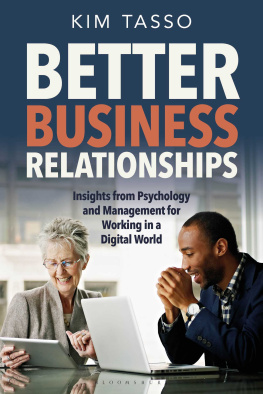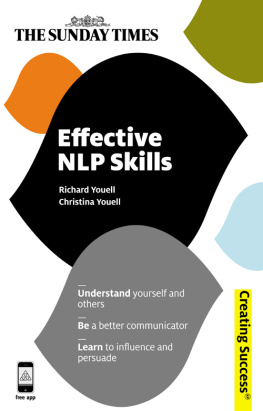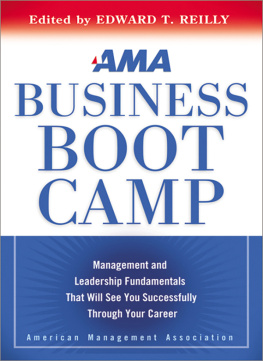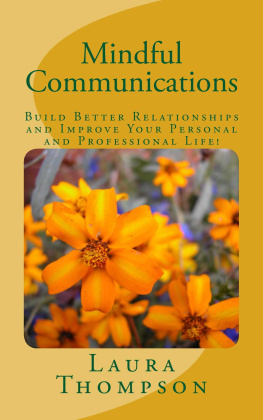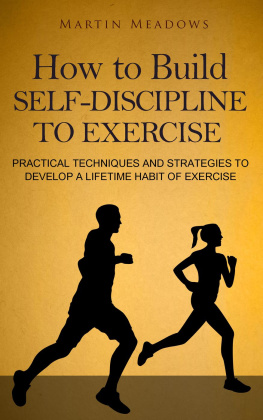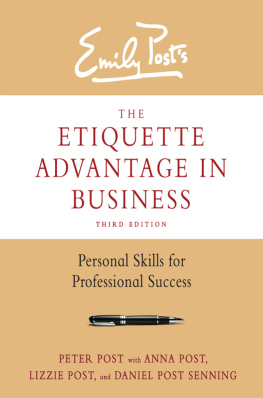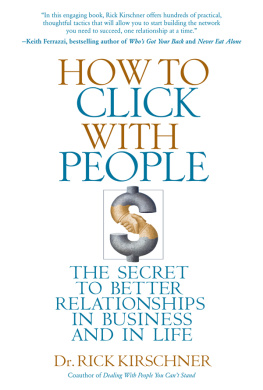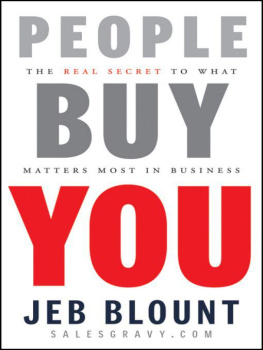
BETTER BUSINESS
RELATIONSHIPS
For my children, James and Lizzie, who are my pride and joy. And for Grant who is my rock.
Occasionally you come across books that are timely, utterly important and overdue. This book is one of them. Tasso holds the readers interest by brilliantly presenting a persuasive argument that oscillates between the basics of psychology and selling. The importance of relationships in business is vital. Better Business Relationships is packed with useful advice which is well written and remarkably thoughtful.
Clive Lewis OBE, DL Business Psychologist; CEO, Globis Mediation Group
Business leaders must be able to build real and meaningful connections with their clients, teams and communities otherwise, are they really leaders? Today, there is definitely a lower tolerance for business leaders without a strong helping of EQ because of the demands of increasingly non-linear, global and network-based markets you have to be able to work across boundaries and deal with diversity. In this context, Better Business Relationships is a timely, thought-provoking and engaging read.
Paul J English, Global Leader, Markets & Clients, Grant Thornton
This book is an engaging read, written in a no-nonsense style and packed with helpful, practical tools and tips for building and maintaining effective business relationships.
Dr Kathryn Waddington, Course Leader MSc Business Psychology, University of Westminster
Kim explodes the myth that business relationships have to be cool and free of emotion. Her distilled wisdom and practical checklists show how best to enhance our natural human ability to communicate with others for mutual benefit.
Richard Chaplin, Founder & Chief Executive, Managing Partners Forum
For anyone whose business depends upon not only building, but maintaining and developing business relationships, this book is a must read. Its a key skill that almost everyone in business needs, but no one teaches you. Kim has a wealth of experience in this space and it shines through. Its a great reference book, but also one that you can dip in and out of and use just as a refresher as I did! Building business relationships is fundamental to individual and collective success, and Kims book is the ideal guide for anyone looking to develop or improve their skills in this fundamentally important area.
Chris Pullen, Business Development Director, EY Law
Business relationships are not the same as social ones, requiring different skills and knowledge. Tasso provides a useful overview of theories, ranging from non-verbal communication, attitudes to change, creating rapport and why relationships sour.
Kiran Kapur, CEO, Cambridge Marketing College
Better Business Relationships is a book for our time. Tasso captures a moment in our evolution where we could all do with refocusing back on what really matters: people. To discover your real self is the key to unlocking and developing engaging relationships with others. This book makes you realise in an era driven by win-lose outcomes, mobile connectivity, advancing new tech, big data and constant automation just how much we need to nurture and hold onto the value of building enduring, collaborative relationships. Ultimately, in business and in many ways life itself, people and their relationships lead to better achievements and results. Perhaps we stand accused today of forgetting this, so the timely reminder, advice and tips are of value to us all and especially those of us in leadership roles who would do well to take note. Who knows, the next decade may even see a return to human kindness, the essence of relationships.
Dr Sean Tompkins (D.Phil. & D.Eng.), Global CEO, Royal Institution of Chartered Surveyors

CONTENTS
Who this book is for and how to use it
This book is for anyone whether they are young or old, male or female, junior or senior, digitally-savvy or digitally-naive who wants to know how to improve business relationships in our digital world. Those business relationships might be with your work colleagues bosses and team members or with those outside your organisation customers, clients and referrers.
The book can be read from start to finish. And this is recommended if you are just starting to explore the world of business relationships. The DACRIE model begins with understanding difference and diversity, considers how we adapt and learn the fundamentals of communication and how relationships are formed, before moving on to improving internal and external relationships. Otherwise, you can go straight to your area of interest and the referencing system will direct you to what else you should read for basic explanations or more advanced ideas.
The centrality of relationships in business
They dont teach you about relationships at school or college. Its assumed that you either already know after all, you are a human being and an inherently social creature. Or you are expected to learn about relationships as you go the trial and error method which can cost you time, effort, some relationships and even your career.
In almost every job you need contact with other people. Even the most autonomous technology jobs will require collaboration with other tech folk, explanations with funders or discussions with clients or users.
Business relationships are important when you are trying to secure a job or interviewing a prospective recruit, when you are joining a team or trying to help a group perform better, whether you are trying to understand how to please your boss or develop the potential of those who work for you, whether you are seeking a promotion or trying to discipline someone, whether you are negotiating with suppliers or selling solutions to clients, whether you are providing great customer service or managing a client complaint.
You need to understand business relationships when you are influencing, persuading and motivating people or trying to change the way they think or behave. Nearly every aspect of business life involves effective business relationships.
Whether I am working with established business leaders or young people who are still in education, it seems to me that some basic knowledge and simple ideas about business relationships will at least save you some hassle and heartache and at best will accelerate your progress.
Combining psychology, communications and selling
My lifelong fascination with the interplay between psychology and business was truly ignited when I heard a futurologist back in 2012. Ian Pearson of Futurizon suggested that, in the future, the majority of jobs would be taken by automation and humans will be relegated to a parallel care economy based on emotional skills, not physical or intellectual ones. His suggestion was that those who mastered human skills would be those most likely to still have jobs. As automation and artificial intelligence march ahead, we can see what he was talking about those who will succeed in the future will be skilled in relationships.
So whilst I am not a leading expert in psychology or selling, I offer an unusual combination of psychology training, sales expertise and experience of helping many business people develop better business relationships. And I apologise in advance to psychology experts who may be horrified at the extent to which I have simplified some really complex concepts in order to make them accessible to readers with no psychology training.
Next page
